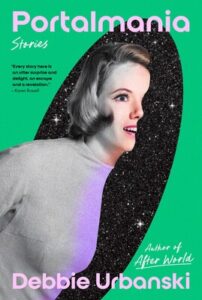
None of Your Business: Why Writers Shouldn't Feel Obligated to Share Too Much
Debbie Urbanski on the Invasive Expectations of Book Publicity and Their Unintended Consequences
If I tell you secrets about my personal life, will you look at my new book?
My first book, a novel called After World, was a relatively comfortable book for me to market in many ways. It takes place in the future, it’s narrated by an AI, and from the very beginning all humans are extinct. This premise made it clear from page one that what followed would be fiction and not of the autofictional sort either, which meant it was easy enough for me to wave my hands in the air and claim the book had nothing really to do with me. I didn’t have to worry about interviews veering into my personal life or my orientation or my identity. I could talk about the book’s surface themes of climate change, species extinction, and the future of AI from a distance, while the more personal themes of suicide and abandonment as a form of love rarely came up.
Certain things I can say in fiction that I can’t—or won’t—say in nonfiction.
After World has been described by various readers as “really bleak,” “relentlessly bleak,” and also “possibly the most bleak thing I’ve ever read,” but the writing of it, which had taken me years, was actually a relief from the stories I was writing at the same time about a dark period in my life that was the perfect storm of marital, family, and mental health troubles. Writing these stories, many of which are included in my collection Portalmania, was a way for me to stay alive. I needed a safe place where I could explore what was happening and my feelings about what was happening. Writing offered me some life-saving dissociation, where I was able to observe myself going through particular events and think, at least this will make a good story.
I realize I’m being vague here.
That’s intentional.
Certain things I can say in fiction that I can’t—or won’t—say in nonfiction. And certain things I’ll allow myself to say in a lyric essay, which is more of a performance on a stage, versus what I will allow myself to say in a more straightforward and unadorned piece like this.
What I will say here: the stories in Portalmania are mostly about asexual women, often depressed and often in mixed-orientation marriages.
Like many of Portalmania’s protagonists, I’m asexual, I had severe and untreated depression for many years, and I’m in a mixed-orientation marriage.
I don’t discuss my sexual orientation with people, even close friends or family. Or at least I hadn’t until I started trying to get attention for Portalmania a few months ago. The last time I had tried to tell people previously, back in 2012, it didn’t go so well. There was this general sense of confusion along with what felt like two unstated questions: why is this declaration of mine necessary? And could I please go back to being who people thought I was?
Because of the content of certain stories, I thought about publishing Portalmania under a pseudonym. I thought about not having a local launch reading. I thought about telling my friends and my family please don’t read this. Few people know me fully as both a writer and as a person. I’ve always kept the two intentionally separate. This allows my writer self to draw on the intense emotions I’ve felt without embarrassment or self-consciousness and create stories that are often violent and dark. My non-writer self is a nice married mom who loves hiking. In my mind, this is a fair but apparently unsustainable division.
There’s this sense I have that my identity isn’t anybody’s business.
But there’s this competing sense that asexuality needs more visibility. It feels vitally important, at a base level of my life, for me to push back against all the things that have been told to me over the years about what a marriage should look like, and what being a mother should look like, and what love and intimacy should look like. One of my reasons for writing throughout this past decade has been to explore the damage that such narrow and heteronormative thinking does while also exploring the possibility that something more expansive and true is possible.
Oh, the stories I could tell.
Only, wait, I have already told these stories, I have been telling them, in my fiction.
I think it’s time to question what we ask of authors, particularly new authors, in exchange for paying attention to them.
In a fascinating New York Times interview, Sally Rooney calls out journalist David Marchese for asking questions about her personal life, even as banal a question as “What do you like to do when you’re not writing?” (This happens in the unedited audio of the interview at about 26:10.) Rooney’s response is to wonder aloud why what she does—outside of her books—should be considered interesting. I think what she means is that an author’s life, her life, isn’t any of our business. Then she expertly guides the interview back to her books.
Easy for Rooney, of course, as people want very badly to talk with her about her novels. Rooney, I’m going to bet, didn’t have to work with her publicist a few months before her latest book came out to brainstorm angles for opinion pieces like this one that subtly promotes the new release. Had I written Intermezzo, I would not (let’s be honest) be writing this essay. But if you’re a relatively unknown author with a forthcoming release, the best thing to do these days—perhaps the only thing, it feels like—is to find a personal and therefore marketable angle.
Is it possible for us to let go of this fascination with the author— whether it’s a fascination with what they look like, or the trauma they experienced, or their biography? What would be left for us to talk about then? The books, of course. We would have to talk about the books and the writing. This would not be the worst outcome imaginable.
I think it’s time to question what we ask of authors, particularly new authors, in exchange for paying attention to them. Everything I wanted and needed to say is in my stories. So why then am I even writing this piece?
I refuse to use my life to sell my fiction.
Now that would make a great ending line if only it were true.
__________________________________

Portalmania by Debbie Urbanski is available from Simon & Schuster.
Debbie Urbanski
Debbie Urbanski is the author of the novel After World. Her stories and essays have been published widely in such places as The Best American Science Fiction and Fantasy, Best American Experimental Writing, The Sun, Granta, Orion, and Junior Great Books. A recipient of a Rona Jaffe Foundation Writers’ Award, she can often be found hiking with her family in the hills south of Syracuse, New York. She is still looking for her portal.



















